Leaf to Cup: Renegade Tea Estate’s Revival of Georgian Tea
Nestled amidst the lush landscapes of Georgia, the Renegade Tea Estate stands as a testament to the country’s forgotten yet reviving rich tea heritage. With its captivating story and dedication to producing exceptional teas, visiting its tea plantation is ideal for tea enthusiasts and those looking for less touristy experiences in Georgia.
But before we get into more details about how Renegade Tea Estate started, it’s essential to give you a brief background on Georgian tea history.
A brief history of Georgian Tea
With a tradition spanning over two centuries, tea cultivation in Georgia has witnessed ups and downs, and today, it’s undergoing a significant revival thanks to small enterprises, just like Renegade Tea Estate.
The story of Georgian tea began in the early 19th century when tea plants were first brought to the country from China. The region’s subtropical climate and fertile soil proved ideal for growing tea in Georgia, leading to the establishment of thriving tea gardens. By the mid-20th century, Georgia had become one of the largest tea producers in the Soviet Union, with its teas renowned within the USSR.
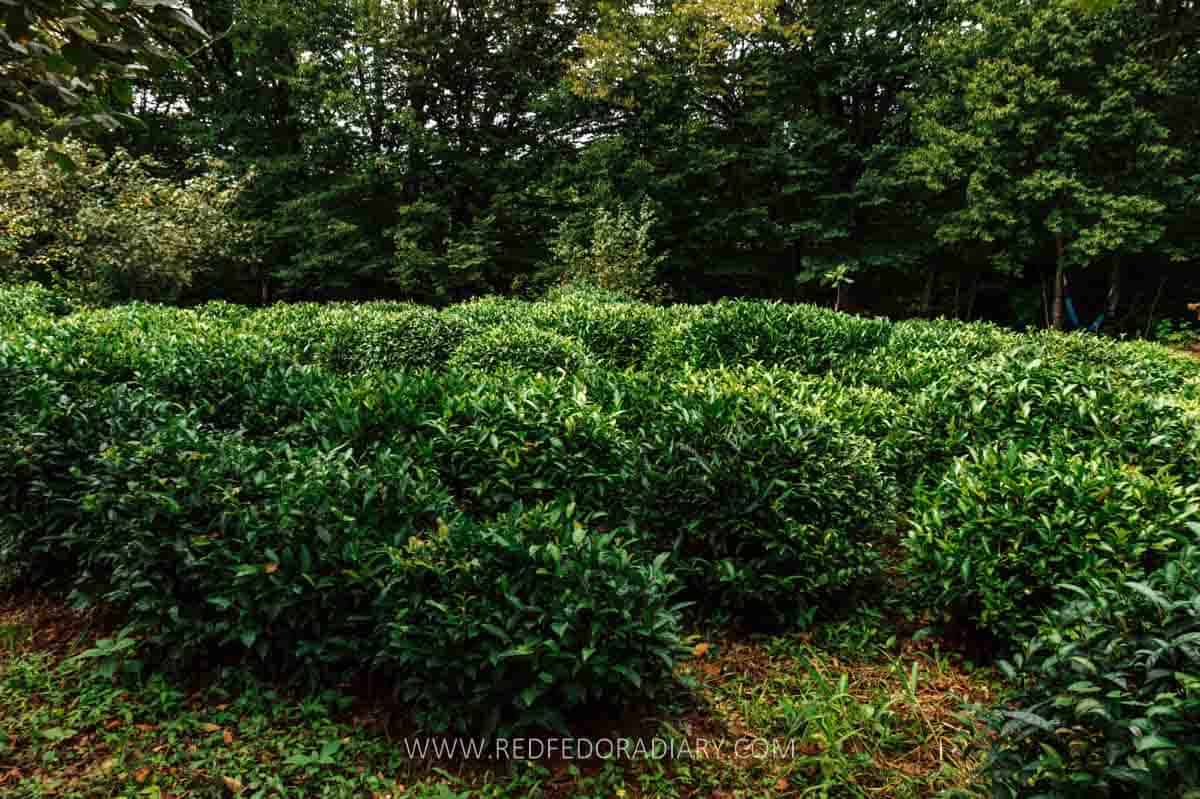
However, political and economic challenges in the 1990s disrupted the tea industry, causing a decline in tea production and the abandonment of many tea farms. In recent years, there has been a resurgence of interest in Georgian tea, driven by a passion for reviving the country’s tea heritage and a commitment to sustainable farming practices.
Today, Georgian tea production embraces organic cultivation methods, focusing on quality over quantity. Hand-plucking of tea leaves is still practiced, ensuring the careful selection of only the finest leaves.
As it continues to make its mark in the local (and a small percentage of international) tea market, it presents a unique experience for tea enthusiasts to discover and appreciate the heritage of this ancient tea-producing country.
To delve deeper into the intriguing history of Georgian tea, read this post, where I explore its humble beginnings, development journey, the unfortunate era of its radical obscurity, and gradual rise.
The story of Renegade Tea Estate
Renegade Tea Estate was born from a shared passion for tea and a desire to return Georgia’s forgotten tea to the map.
Founded by a group of former corporate office workers from Lithuania and Estonia, this tea estate began creating exceptional, artisanal teas using organic practices. The team’s dedication to quality and innovation quickly earned them a reputation for producing some of the finest teas in Georgia.
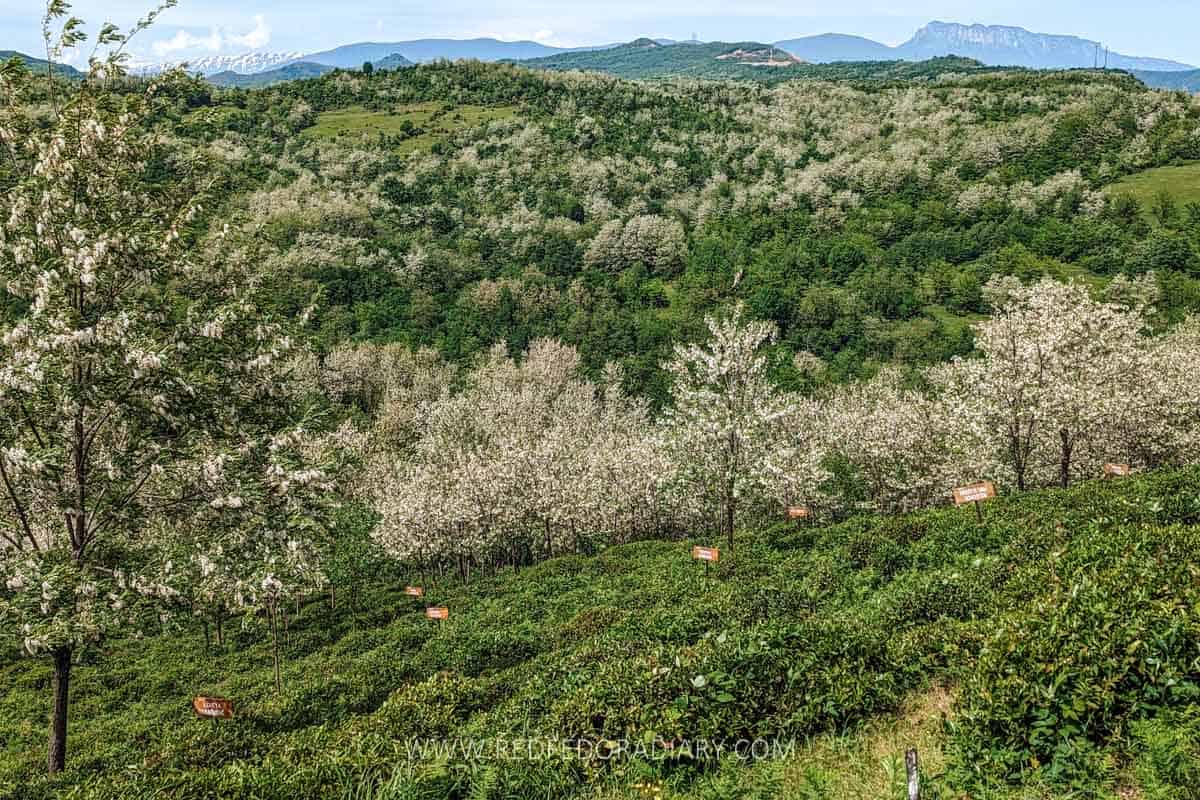
The journey of Renegade Tea Estate began with a deep appreciation for Georgia’s tea history, heritage and disbelief in the collapse of a once very flourishing industry.
Witnessing the deserted tea fields scattered across the hills of western Georgia and observing the gradual decline of small towns devoid of employment opportunities and prospects has ignited a profound impulse and determination within the team to take action.
Moreover, they firmly believe that the world deserves to be acquainted with Georgia’s exceptional and pure tea.
Why name the company ‘Renegade’?
After deciding to leave their established and well-developed professional careers to become tea farmers, they all experienced a sense of being Renegades – individuals who have embraced an alternative path and refuse to let societal norms interfere with their pursuit.
They also identify themselves as Renegades because they aspire to construct a tea company that deviates from the norm. They intend to steer clear of “corporatization” and rapid expansion. While quality is paramount for them, their goal is to create an exceptionally genuine and intimate tea estate unlike any other.
Creating Renegade farms
In 2017, they found an abandoned tea plantation near Kutaisi with around 70 years old tea bushes to start the company. The team brought a tea grower from Nepal to teach them everything about tea production and cultivation. Since then, they took his knowledge and started experimenting with tea.
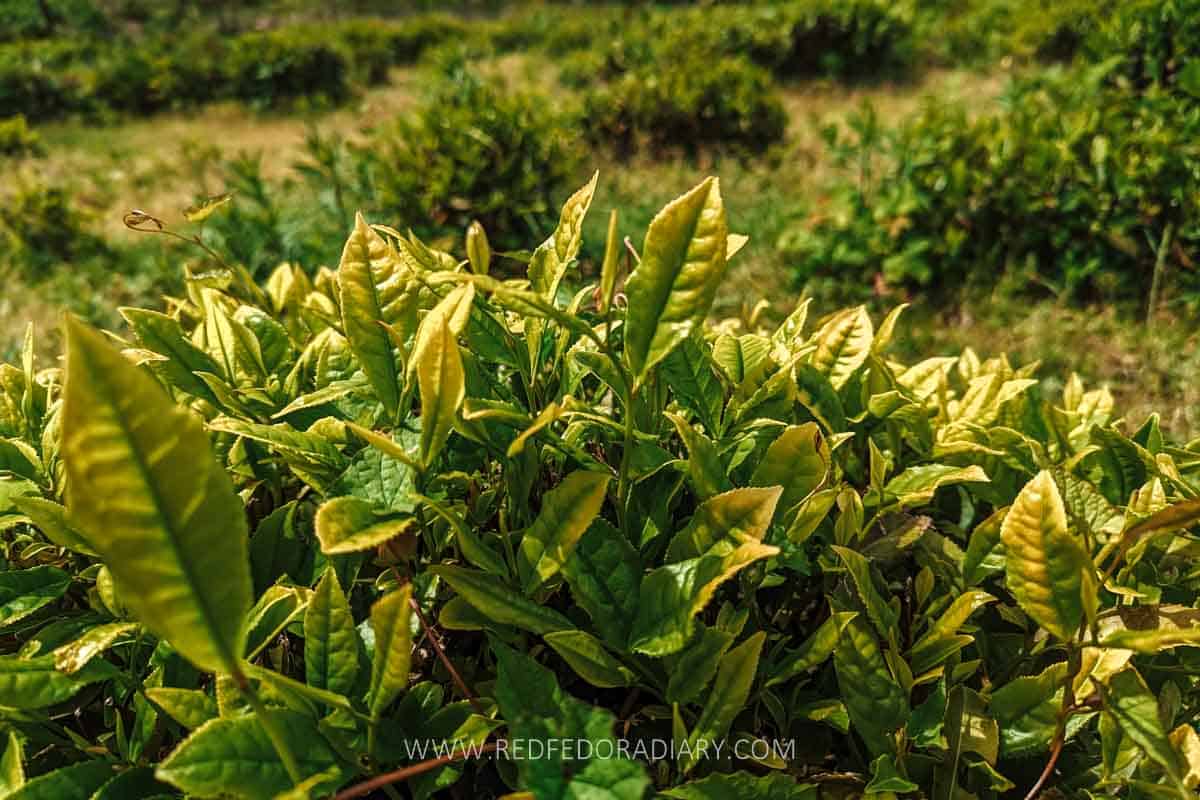
At first, the tea farm looked like an overgrown forest, and they didn’t know how much tea was underneath. They knew that a tea farm was here during Soviet times, so they took a good guess that tea was growing underneath the brambles and ferns. Tea bushes can grow spindly up to two and a half meters when left to grow wild.
“Although you can make tea from wild bushes, they’re not very practical for a tea farm,” Amy, who does tea tours at Renegade Tea Estate, tells me. “One of our first jobs was to cut the undergrowth right back to uncover the tea.”
If you’ve visited tea plantations in other countries, you might have noticed the high and symmetrically aligned bushes. Here, at Renegade, the tea bushes in some parts of the farm are pretty low, with gaps between them, partly because they are still recovering from being abandoned for a long time and need some time to regrow.
Currently, Renegade Tea Estate covers 45 hectares of tea fields 20 minutes away from Kutaisi in Imereti, with three plantations in total.
What cultivar does Renegade Tea Estate grow?
Considering the state of the tea plantation they acquired, it’s hard to know which cultivars grow in different parts of the farm. Renegade knows that Assamican, Cambodian, and Chinese cultivars were grown from seed in these fields.
A tea cultivar refers to a specific variety or subspecies of the tea plant known as Camellia Sinensis. Cultivars are cultivated and propagated for their unique characteristics, including leaf shape, flavor profile, aroma, and growth habits. In some parts of the farm, the leaves have a purple tint or particular-shaped leaves.
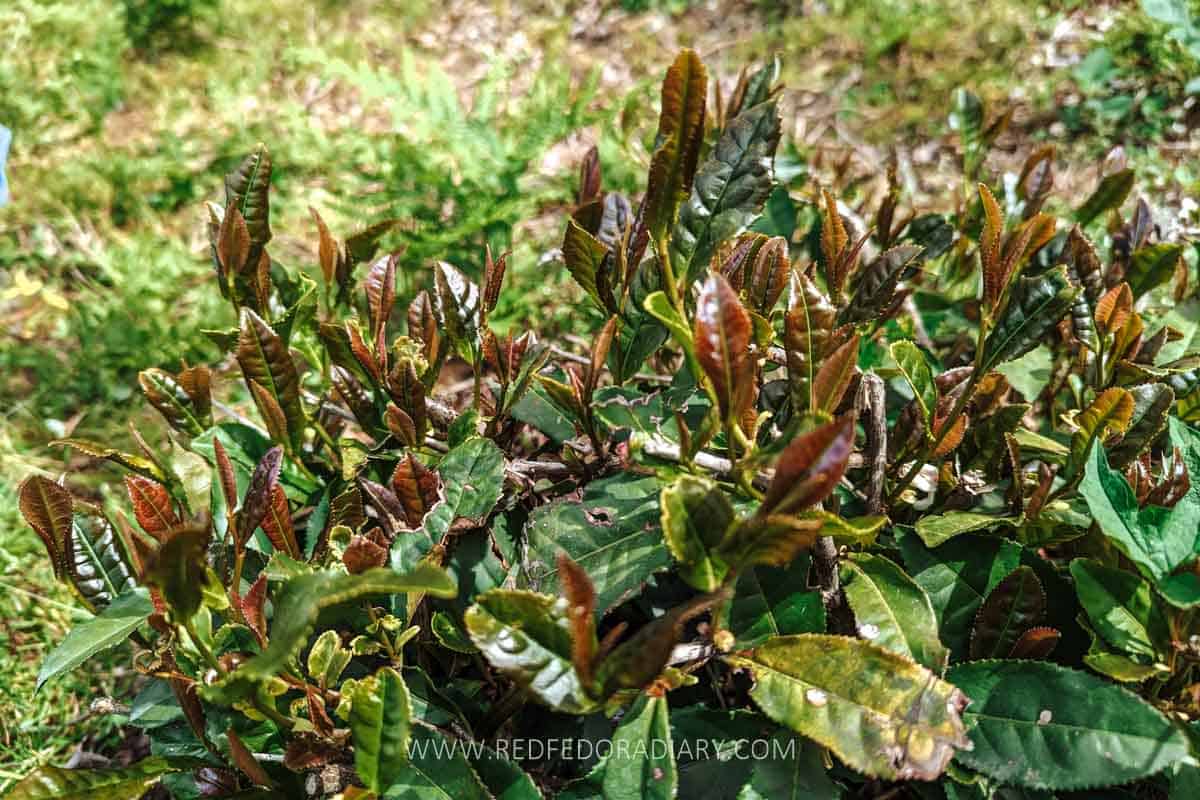
Different tea cultivars can exhibit taste, appearance, and suitability variations for other growing conditions. Tea cultivars play a significant role in determining the quality, flavor, and overall characteristics of the tea produced. However, the tea-making process has the most significant impact on the flavor and type of tea.
Since these bushes were planted so long ago, all they know is that they are a mix because the seeds have spread everywhere within the farm territory and might have cross bread. According to Amy, the Soviet government developed a lot of Georgian cultivars, so some of the bushes may also be authentic to Georgia.
Caring for tea bushes
Western Georgia’s subtropical climate is ideal for growing tea. The cold winters make Georgia a perfect region for growing tea organically, as it kills off tea pests naturally.
The most significant tasks are pruning and trimming the bushes over winter to ensure enough sunlight and air gets to the leaves. The bushes are cut right back every five years to encourage them to grow productively. In the early days, Renegade also made some mistakes as they learned to become tea farmers, overplucking the bushes in some fields.
The tea plucking season depends on the weather, but as a general rule of thumb, it starts from the end of April and continues until roughly the end of September. Every field has five flushes, so about once every month, tea farmers pluck the leaves.
Another archnemesis of tea farming is weeds, especially ferns. Weeding between the tea bushes is a never-ending process in spring and summer. Renegade also has to continuously chase cows out of the fields who like to break through the fences and munch on the tea!
Tea farmers are at the mercy of the weather. The climate here is subtropical, and tea likes the moisture in the air. Last summer, though, August was almost 40 degrees every day which stressed the tea bushes and burned the leaves.
How does Renegade Tea Estate make its tea?
You can make any type of tea from the same bush. The tea’s flavor, smell, and characteristic in your cup is determined by the terroir, soil, and climate where the tea bushes grow. Even the season and the weather on the day when the leaves are plucked make a difference.
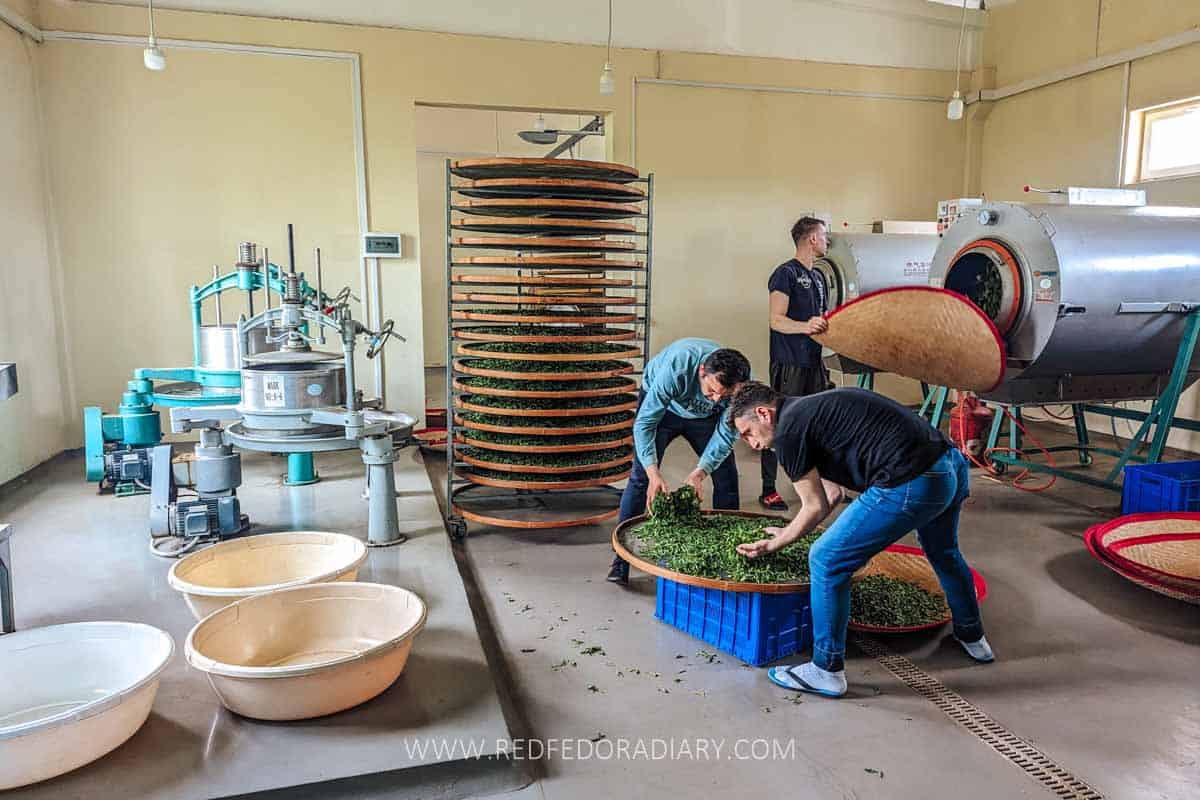
Making tea is a natural process that plays with air, heat, and time to bring out the different flavors of the leaf. The tea-making steps are withering, rolling, oxidizing, and fixing. Each tea recipe is different depending on the flavor profile of the finished tea. Hannes and Tomas, two of the founders of the Renegade Tea Estate, make 17 different tea recipes, each unique and developed through many experiments.
Amy explains that tea-making is as much an art as a science. How many flavors you can create from one leaf through the natural tea-making process is pretty magical.
It was my first time hearing the word ‘recipe’ regarding tea. The tea recipe means playing with time, heat, whether you are roasting it or not, etc.
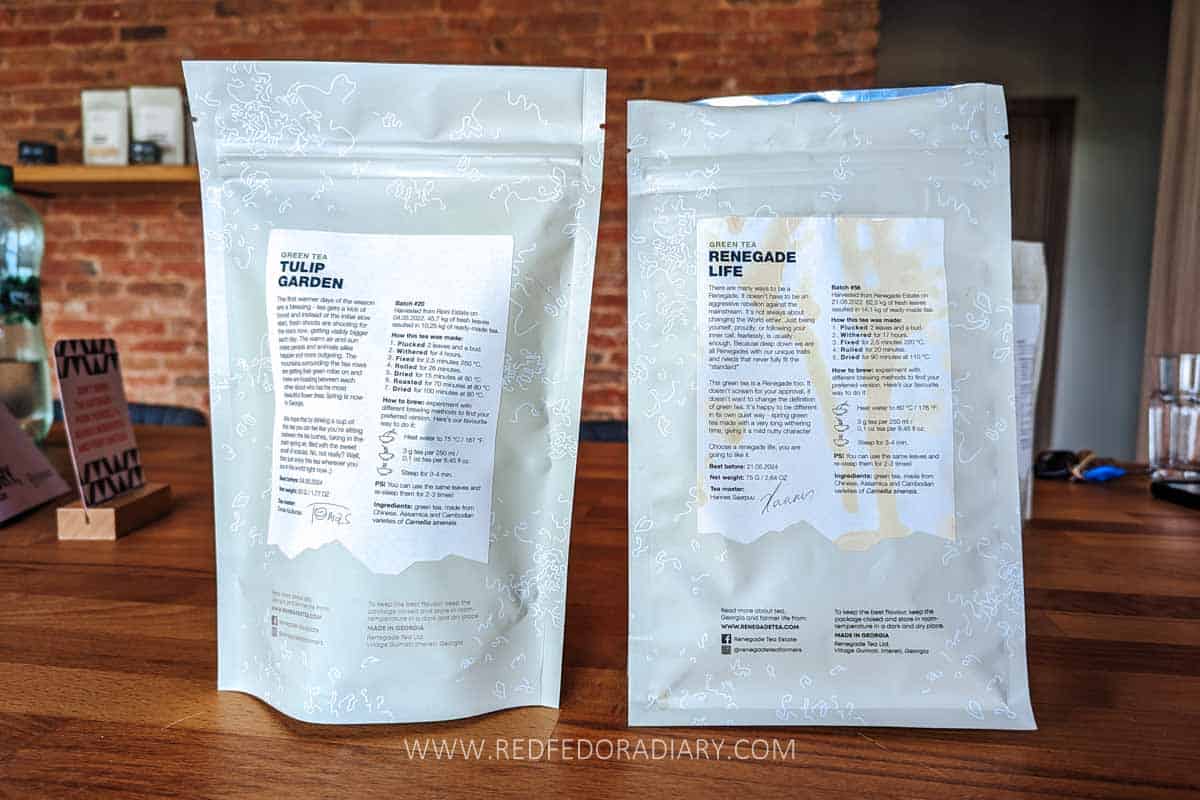
If you line up like all of Renegade’s teas, you’ll have everything from clear liquid to dark chocolaty brown and everything in between, from yellow to amber to caramel. And they all would have different flavors, which is mindblowing. From just one leaf, all from the same bushes.
Renegade Tea Estate specializes in crafting pure, single-origin loose-leaf tea without chemicals and maintaining organic farming practices.
Currently, Renegade makes 17 different types of tea from the same bush – six of which are black, five green, five oolongs, and one white.
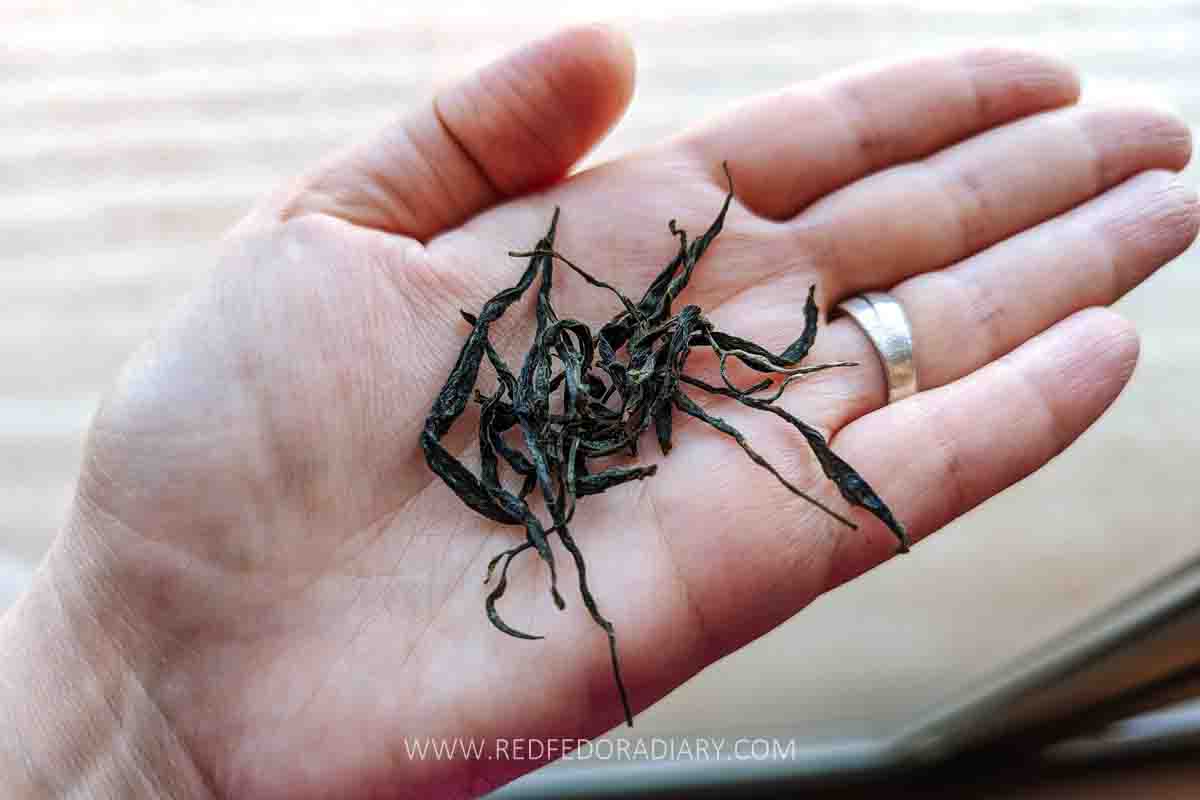
And much like wine, their teas exhibit subtle variations from season to season and even from batch to batch. Each package includes the recipe it was created, listing down how many hours it was withered, fixed, rested, rolled, dried, and roasted.
In a tea competition last year, their Georgian Breakfast won silver, and Oolong won bronze, which is pretty impressive for a five-year-old tea grower and a farm.
The crowd-farming business model of Renegate Tea Estate
One of the unique features of the Renegade Tea Estate is that they have a community garden farming. What does this mean? For a fee, around 2000 people adopted a tea bush at their farm in 2022 to get their yearly supply of Renegade tea.
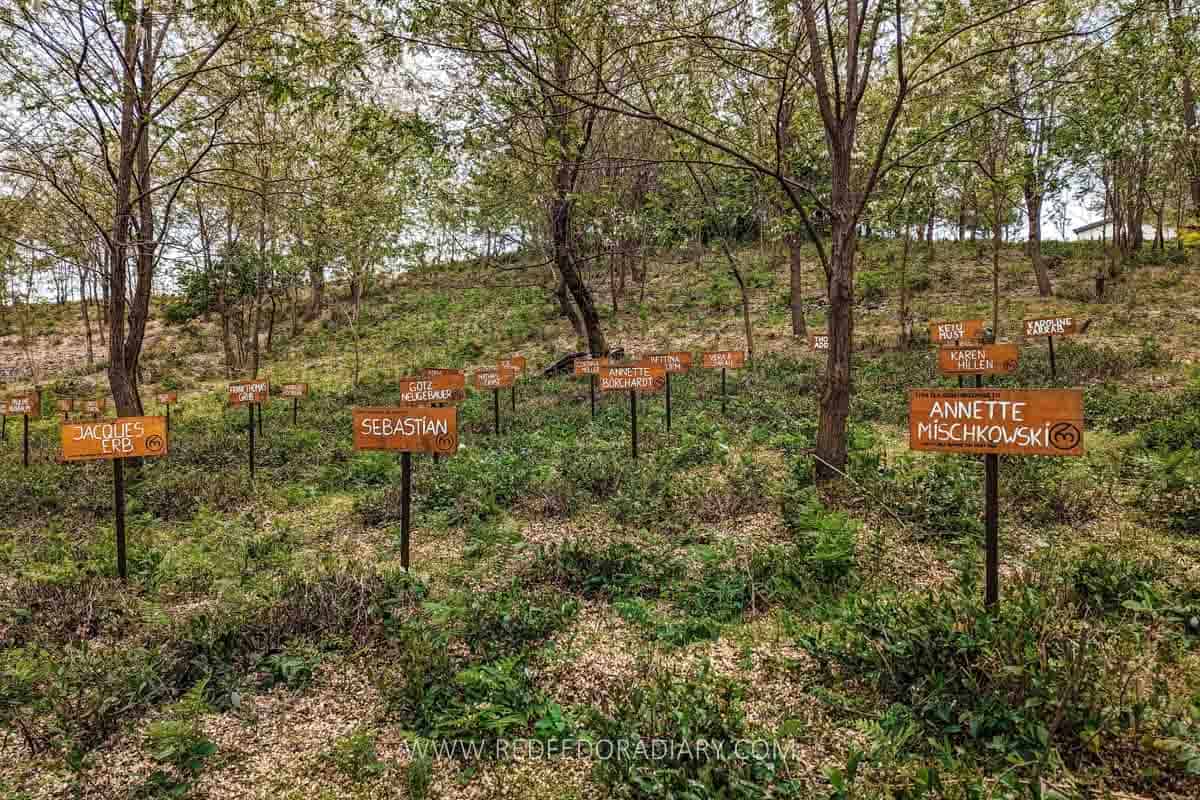
This supports the already complex business of reviving Georgian tea and gives the adopted family something unique – tea grown particularly for them on the picturesque slopes of the Georgian countryside.
Where to buy Renegade tea
You won’t be able to see Renegade tea in usual shops across Georgia. The only way to get them is by visiting the farm or ordering online. The farm works with a community model whereby you ‘adopt a tea garden and receive your yearly tea supply from the farm.
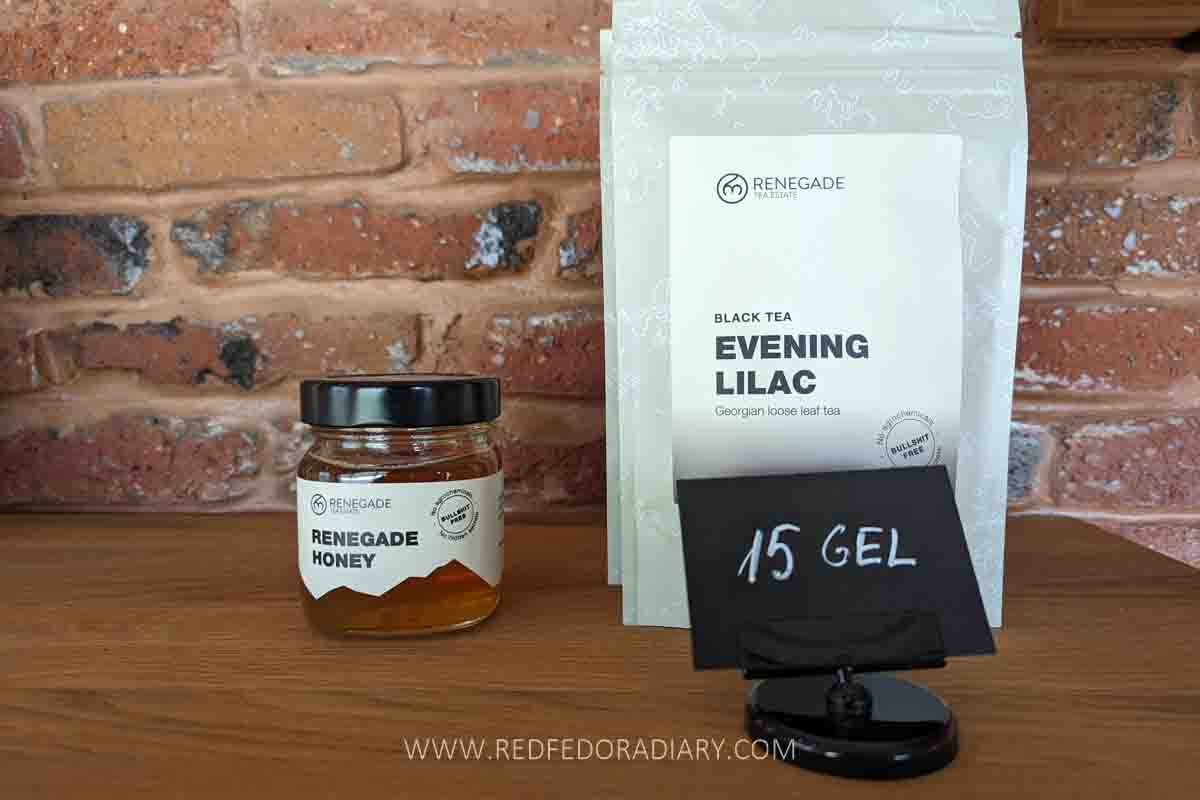
The company mainly exports its teas to a tea shop chain in Germany, the Baltic states, and Fortnum and Mason in London, to name a few. If the season goes well this year, they hope to offer their tea to buy at more places in Georgia.
Kutaisi Airport used to have a Renegade shop, but they no longer look at the local market.
As Amy shares her opinion, the buying power and awareness around loose-leaf teas are more robust in Europe and abroad than in Georgia, sadly. “It’s ridiculous to see how hard it is to find Georgian tea in Georgia,” she adds.
How to visit the tea farm
For those eager to experience authentic and organic tea, I highly recommend booking a visit to the estate. Immerse yourself in the history of Georgian tea, peek into the meticulous tea production process, and indulge in a tea-tasting session that will leave your senses awakened.
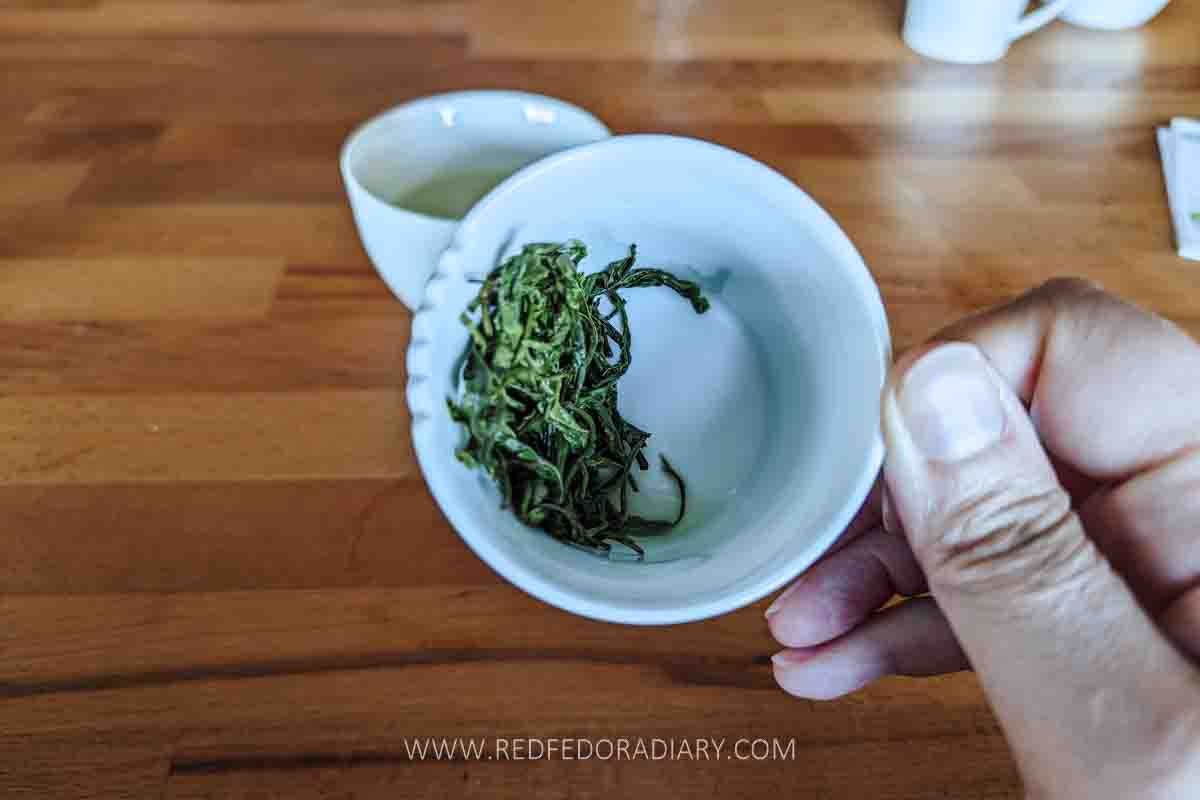
Renegade Tea Estate is located 10km from Kutaisi, making it an ideal half-day tour from the city. You can rent a car if you plan on seeing the surrounding sites of Kutaisi, hire a driver via Gotrip.ge, or use a Bolt taxi.
Tip: First time using Bolt? Use code YRP76 to get discounts on your first rides.
During the farm tour, Amy will tell you all about the history of Georgian tea, how tea is cultivated and produced, and about Renegade’s crazy adventure of becoming tea farmers.
You’ll walk through Renegade’s tea fields while explaining how Renegade started and what they do. She’ll show you how to determine old and fresh tea leaves and tell you which are considered premium quality leaves.
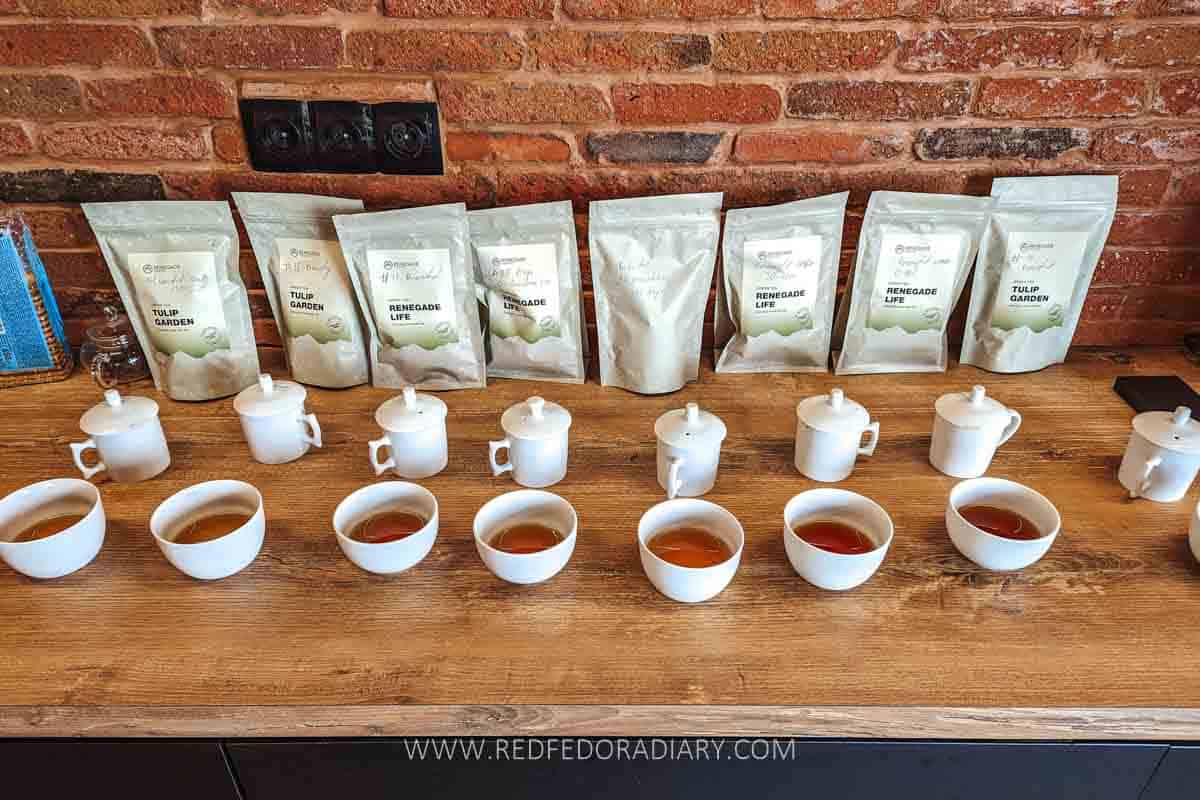
You’ll also peek into the factory and glimpse at the tea production. Then, Amy will guide you to a tasting room, where you might meet Hannes slurping on fresh batches of tea to check their flavor.
This is your second glimpse at their tea production and his experimental recipes. As Amy explained, tea tastes different when it cools down, so Hannes would come and taste throughout the day, make notes, and adjust.
The tour includes tasting at least three teas – black, green, and Oolong. She is very enthusiastic about Georgian tea in general and will explain everything she knows about tea and the differences between the types.
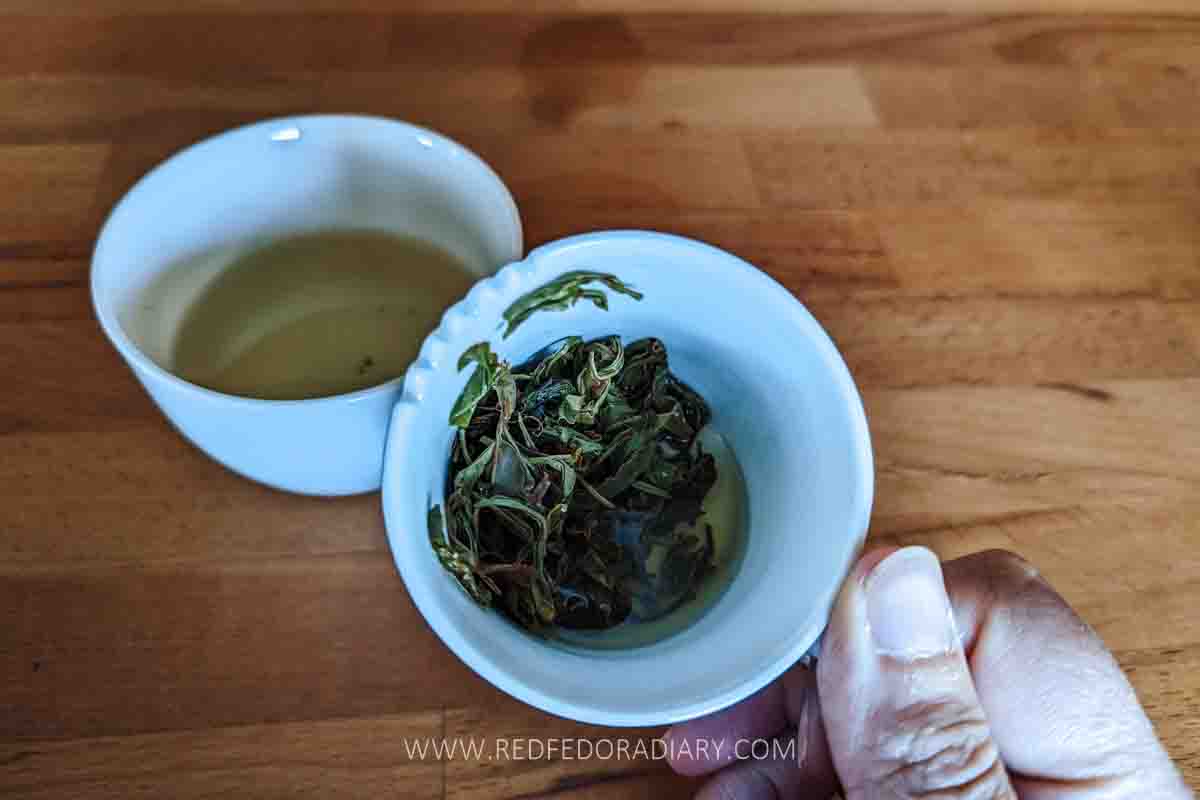
You’ll learn details about the characteristic of the teas you never heard of before if this is your first time experiencing tea.
The tours take place on Tuesday, Thursday, Friday, and Sunday at 10:30 am. They last for around 2 hours and cost 40 GEL per person. You can reserve your spot directly on their website.
Details to get in touch:
- Address: pin on Google Maps
- Website: renegadetea.com
- Book the tour: on their website
- Social networks: Facebook / Instagram
- Rent a car via Local Rent in Kutaisi for affordable prices.
- Hire a private diver via GoTrip.ge
- Use Bolt Taxi for the transfer. Use code YRP76 for a discount on the first ride.
My Favorite Travel Resources
To ease your travel planning, check out all the posts about Georgia travel. Additionally, here are some of the websites and services I use when preparing for my next adventure anywhere in the world.
✈ Book affordable flights on Skyscanner, a platform that shows the best flight deals.
🚫 Get compensation for up to 700$ with Airhelp if your flight was canceled or delayed within the last 3 years.
🚗 Rent a car at Local Rent for affordable prices and convenient service.
❣ Pre-book a private car transfer with GoTrip from Tbilisi Airport to your hotel or any other city across Georgia.
💻 Get a VPN from Surfshark to protect your devices from hackers when using public Wi-Fi when traveling.
📱 Install the Airalo app, which provides local eSIMs for a more affordable internet connection when traveling. Get 3 USD with code: BAIA2592.
💸 Use Wise to withdraw money in local currency without hidden fees and avoid high exchange rates. On top, you might get a Visa or Mastercard debit card.
🍷 For some of the best, expat-designed wine tours check out Eat!ThisTours. Get a 5% discount with code RFD5.
🏨 Find budget-friendly deals on all sorts of accommodation types on Booking.com.
🩺 Buy the most flexible and budget-friendly travel insurance, SafetyWing, covering COVID.
☀ Book in advance some of the best city walks, cultural experiences, and day tours to maximize your stay and experience here.

